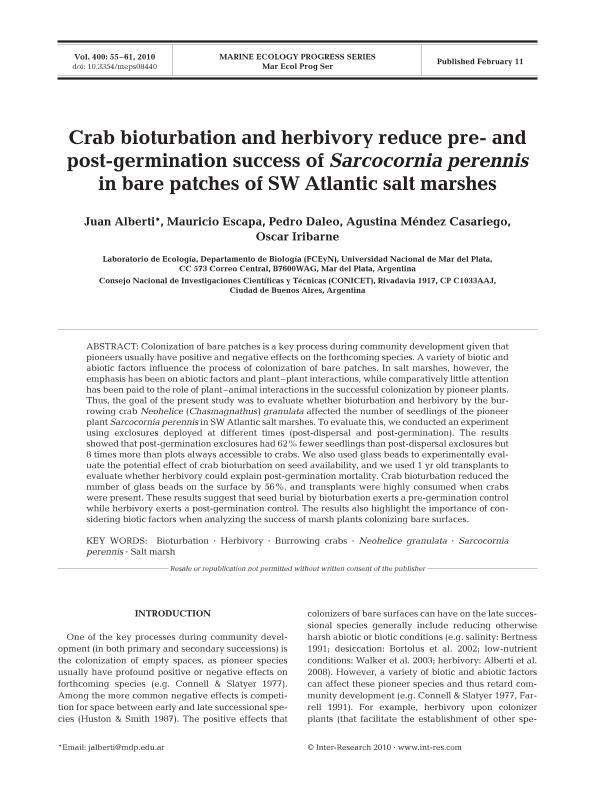Mostrar el registro sencillo del ítem
dc.contributor.author
Alberti, Juan

dc.contributor.author
Escapa, Carlos Mauricio

dc.contributor.author
Daleo, Pedro

dc.contributor.author
Mendez Casariego, Maria Agustina

dc.contributor.author
Iribarne, Oscar Osvaldo

dc.date.available
2020-03-20T20:41:32Z
dc.date.issued
2010-01
dc.identifier.citation
Alberti, Juan; Escapa, Carlos Mauricio; Daleo, Pedro; Mendez Casariego, Maria Agustina; Iribarne, Oscar Osvaldo; Crab bioturbation and herbivory reduce pre- and post-germination success of Sarcocornia perennis in bare patches of SW Atlantic salt marshes; Inter-Research; Marine Ecology Progress Series; 400; 1-2010; 55-61
dc.identifier.issn
0171-8630
dc.identifier.uri
http://hdl.handle.net/11336/100526
dc.description.abstract
Colonization of bare patches is a key process during community development given that pioneers usually have positive and negative effects on the forthcoming species. A variety of biotic and abiotic factors influence the process of colonization of bare patches. In salt marshes, however, the emphasis has been on abiotic factors and plant-plant interactions, while comparatively little attention has been paid to the role of plant-animal interactions in the successful colonization by pioneer plants. Thus, the goal of the present study was to evaluate whether bioturbation and herbivory by the burrowing crab Neohelice (Chasmagnathus) granulata affected the number of seedlings of the pioneer plant Sarcocornia perennis in SW Atlantic salt marshes. To evaluate this, we conducted an experiment using exclosures deployed at different times (post-dispersal and post-germination). The results showed that post-germination exclosures had 62% fewer seedlings than post-dispersal exclosures but 8 times more than plots always accessible to crabs. We also used glass beads to experimentally evaluate the potential effect of crab bioturbation on seed availability, and we used 1 yr old transplants to evaluate whether herbivory could explain post-germination mortality. Crab bioturbation reduced the number of glass beads on the surface by 56%, and transplants were highly consumed when crabs were present. These results suggest that seed burial by bioturbation exerts a pre-germination control while herbivory exerts a post-germination control. The results also highlight the importance of considering biotic factors when analyzing the success of marsh plants colonizing bare surfaces.
dc.format
application/pdf
dc.language.iso
eng
dc.publisher
Inter-Research

dc.rights
info:eu-repo/semantics/openAccess
dc.rights.uri
https://creativecommons.org/licenses/by-nc-sa/2.5/ar/
dc.subject
BIOTURBATION
dc.subject
BURROWING CRABS
dc.subject
HERBIVORY
dc.subject
NEOHELICE GRANULATA
dc.subject
SALT MARSH
dc.subject
SARCOCORNIA PERENNIS
dc.subject.classification
Ecología

dc.subject.classification
Ciencias Biológicas

dc.subject.classification
CIENCIAS NATURALES Y EXACTAS

dc.title
Crab bioturbation and herbivory reduce pre- and post-germination success of Sarcocornia perennis in bare patches of SW Atlantic salt marshes
dc.type
info:eu-repo/semantics/article
dc.type
info:ar-repo/semantics/artículo
dc.type
info:eu-repo/semantics/publishedVersion
dc.date.updated
2020-01-28T14:59:17Z
dc.journal.volume
400
dc.journal.pagination
55-61
dc.journal.pais
Alemania

dc.journal.ciudad
Oldendorf
dc.description.fil
Fil: Alberti, Juan. Consejo Nacional de Investigaciones Científicas y Técnicas; Argentina. Universidad Nacional de Mar del Plata. Facultad de Ciencias Exactas y Naturales. Departamento de Biología. Laboratorio de Ecología; Argentina
dc.description.fil
Fil: Escapa, Carlos Mauricio. Universidad Nacional de Mar del Plata. Facultad de Ciencias Exactas y Naturales. Departamento de Biología. Laboratorio de Ecología; Argentina. Consejo Nacional de Investigaciones Científicas y Técnicas; Argentina
dc.description.fil
Fil: Daleo, Pedro. Consejo Nacional de Investigaciones Científicas y Técnicas; Argentina. Universidad Nacional de Mar del Plata. Facultad de Ciencias Exactas y Naturales. Departamento de Biología. Laboratorio de Ecología; Argentina
dc.description.fil
Fil: Mendez Casariego, Maria Agustina. Consejo Nacional de Investigaciones Científicas y Técnicas; Argentina. Universidad Nacional de Mar del Plata. Facultad de Ciencias Exactas y Naturales. Departamento de Biología. Laboratorio de Ecología; Argentina
dc.description.fil
Fil: Iribarne, Oscar Osvaldo. Universidad Nacional de Mar del Plata. Facultad de Ciencias Exactas y Naturales. Departamento de Biología. Laboratorio de Ecología; Argentina. Consejo Nacional de Investigaciones Científicas y Técnicas; Argentina
dc.journal.title
Marine Ecology Progress Series

dc.relation.alternativeid
info:eu-repo/semantics/altIdentifier/doi/http://dx.doi.org/10.3354/meps08440
dc.relation.alternativeid
info:eu-repo/semantics/altIdentifier/url/https://www.int-res.com/abstracts/meps/v400/p55-61/
Archivos asociados
